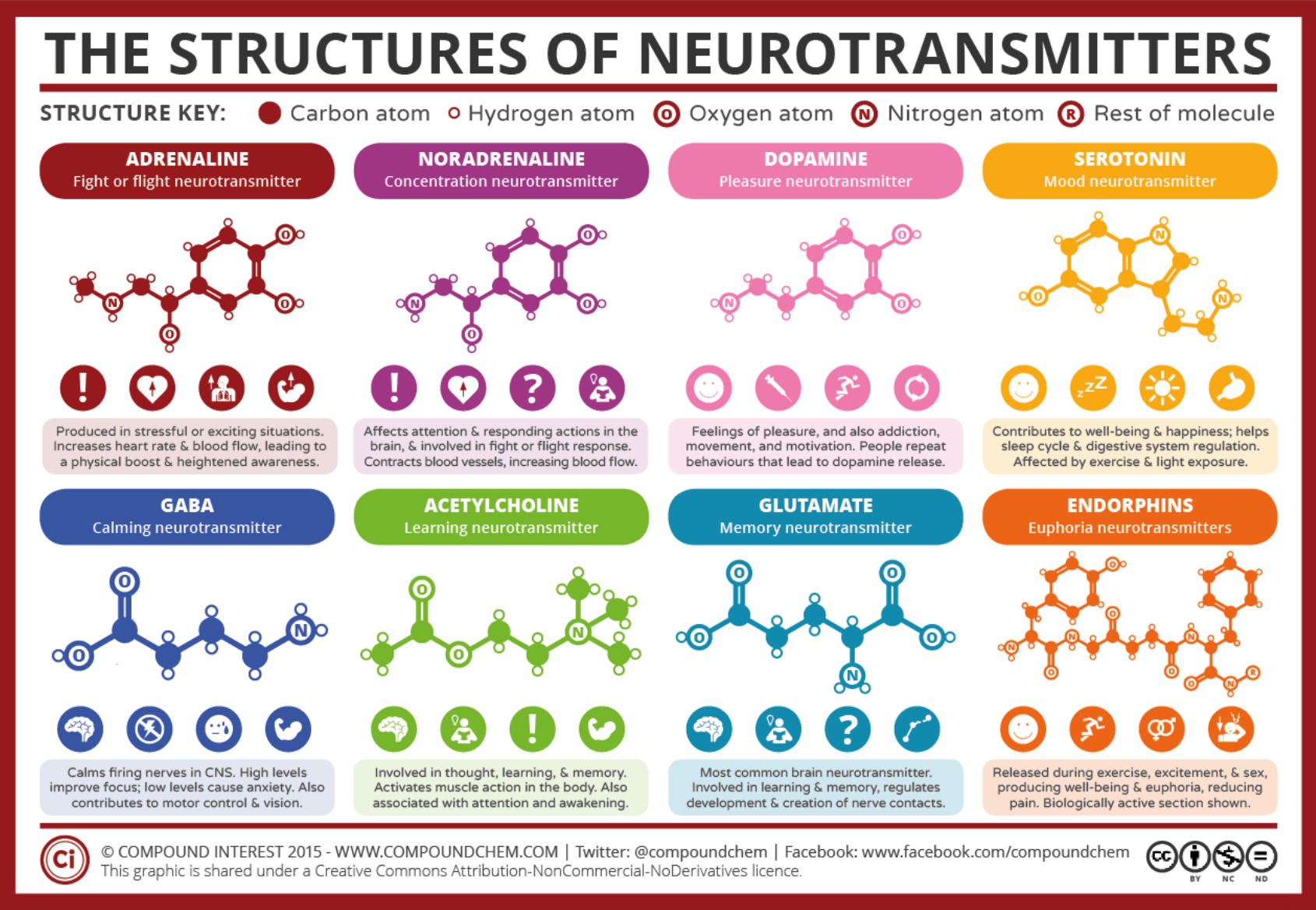What's On This Page?
ToggleDo you worry too much? Have you ever found yourself lying awake at night, staring at the ceiling, and wondering why you just can’t stop thinking about something that is really benign? Or maybe not benign, but still! You’re not alone. According to the Anxiety and Depression Association of America (ADAA), anxiety disorders are the most common mental illness in the U.S., affecting 40 million adults every year.
But what’s behind all this worry? It turns out, it might just be a matter of brain chemistry and genetics. Let’s dive into the world of neurotransmitters and genetic factors that can make worry and anxiety a constant companion, and explore how we can manage them through both conventional and holistic approaches.
Meet the Neurotransmitters that Impact “Worry”
Serotonin: The Mood Regulator
Serotonin is often hailed as the brain’s natural mood stabilizer. It’s like the calm best friend who always knows just what to say to make you feel better. When serotonin levels are low, it can lead to anxiety and depression. Selective serotonin reuptake inhibitors (SSRIs), such as Prozac (fluoxetine), are commonly prescribed to increase serotonin levels and help manage these conditions.
But what if you prefer a more natural approach? There are several herbal supplements that can help boost your serotonin levels and that will reduce anxiety and worry.
- St. John’s Wort: This herb is often used for mild to moderate depression. A typical dose is 300 mg, taken three times a day. Just be careful if you’re already on other medications, as St. John’s Wort can interact with many drugs.
- 5-HTP (5-Hydroxytryptophan): This supplement is a direct precursor to serotonin. The recommended dose is usually between 100-300 mg per day. It can help improve mood and reduce anxiety, but it’s always best to start with a lower dose and see how your body reacts.

Dopamine: The Motivator
Dopamine is all about reward and motivation. It’s the neurotransmitter that gives you that little rush of pleasure when you achieve something. However, both high and low levels of dopamine can cause mood disturbances, including anxiety.
Medications like Wellbutrin (bupropion) can help balance dopamine levels, but there are also natural ways to boost this important neurotransmitter.
- Mucuna Pruriens: This tropical legume is a natural source of L-DOPA, and that’s a direct precursor to dopamine. The typical dose is 300-500 mg of a standardized extract per day. It can help improve mood and increase motivation. You’ll want to titrate this supplement slowly, don’t take too big of a dose for yourself at the beginning. Doing so can lead to side effects like hypertension, tachycardia, problems with menstrual cycles, and dyskinesia which is a movement disorder that causes Parkinson’s-like symptoms.
- Rhodiola Rosea: This adaptogen helps the body adapt to stress and supports healthy dopamine levels. A common dose is 200-600 mg per day. It’s best to start with a lower dose and gradually increase it. The reason for the titration is because if you take a lot of it all at once and you’re not used to it, you can experience insomnia, anxiety, the jitters, dizziness and/or a bad headache.
If you have an extra few minutes, read this awesome article I wrote which discusses adaptogens and how they can help you cope, and possibly relieve fatigue, beat insomnia, depression, anxiety and much more: Unleashing The Power Of Adaptogens: 10 Astonishing Benefits You Need To Know!

Norepinephrine: The Stress Responder
Norepinephrine is part of the body’s stress response system. It’s like the alarm bell that goes off when you’re in danger. High levels of norepinephrine can lead to heightened anxiety and worry. Medications like beta-blockers can help reduce the effects of norepinephrine in anxiety disorders.
If you’re looking for herbal options, consider these:
- Ashwagandha: This adaptogen helps reduce stress and stop the worry. It can balance norepinephrine levels. The typical dose is 300-500 mg of a standardized extract taken twice daily. It’s known for its calming effects and can help reduce anxiety. I’ve discussed this very special herb in my other article, 8 Natural Remedies For Stress And Anxiety: Finding Calm Amidst Uncertainty.
- L-Theanine: Found in matcha and green tea, L-theanine promotes relaxation without drowsiness. The recommended dose is 200-400 mg per day. It’s great for taking the edge off anxiety, and promoting a state of calm. If you worry too much, drink a cup of green tea (or matcha tea even better), and it should calm you down within 30 minutes.
Gamma-Aminobutyric Acid (GABA): The Calmer
GABA is the brain’s primary inhibitory neurotransmitter. It’s like the brain’s natural chill pill, helping to calm neural activity. Low levels of GABA are associated with increased anxiety. Benzodiazepines, such as Xanax (alprazolam), enhance the effect of GABA and are often used to treat acute anxiety.
Herbal options to boost GABA include:
- Valerian Root: This herb is commonly used for its calming effects and can help increase GABA levels. The typical dose is 300-600 mg of valerian extract taken 30 minutes to two hours before bedtime.
- Passionflower: Passionflower, or Passiflora incarnata, is renowned for its anxiety-reducing properties. It works by boosting gamma-aminobutyric acid (GABA) levels in the brain, which helps calm the nervous system and promote relaxation. The recommended dose is 300-400 mg of standardized extract daily, effective for alleviating anxiety, restlessness, and mild insomnia.

Passionflower is also beneficial for improving sleep quality by enhancing GABA activity, leading to deeper, more restful sleep. It is often combined with other calming herbs like valerian root and chamomile for synergistic effects.
My Sleep Script Tranquility supplement contains passionflower, making it a great choice for those seeking a natural way to manage worry and support better sleep.* Always consult a healthcare professional before starting any new supplement to ensure it’s right for you.
Genetic Factors
COMT Gene: The Dopamine Regulator
The COMT (catechol-O-methyltransferase) gene is involved in the breakdown of dopamine and norepinephrine. Individuals with certain COMT gene polymorphisms may break down dopamine more slowly, leading to higher levels that can contribute to anxiety and worry.
So, the COMT gene is like a ‘cleanup crew’ for brain chemicals dopamine and norepinephrine. It helps break them down so they don’t build up too much. But not everyone’s COMT gene works the same way. Some people have a version of this gene that breaks down these chemicals more slowly. When dopamine and norepinephrine stick around longer than they should, it can lead to higher levels in the brain. It’s the buildup of the neurotransmitters that can make you feel more anxious and worried, not the neurotransmitters themselves.
For example, think of dopamine as the “feel-good” chemical and norepinephrine as the “alert” chemical. If they’re not cleared away (metabolized) properly, the constantly high levels can keep you in a state of heightened alertness and stress, contributing to anxiety. It makes you worry about something, even when all is well in reality.
It’s hard to overcome a COMT polymorphism sometimes, it takes trial and error. A few things off the top of my head that could help you include magnesium because it relaxes your nervous system. Also, B complex, particularly B6, B12 and folate. Eating leafy greens and eggs my give you what you need if you want a tiny boost.
Exercise helps, and possibly L-theanine found in matcha/green tea. There’s much more on this topic, however I will have to write about it in a more targeted blog another day. I’m trying to cover things at a high level right now.

SLC6A4 Gene (Serotonin Transporter Gene): The Serotonin Balancer
This gene (SLC6A4) controls serotonin absorption in the brain. Serotonin isn’t made in the brain (just a teeny bit) which surprises most people. It’s made in the gastrointestinal tract. You can read one of my other articles about that, 5 Tips To Boost Serotonin: How The Gut-Brain Axis Works.
The point is that you may have a genetic predisposition due to having this SNP such that you are more prone to anxiety due to serotonin absorption issues. Different versions of this gene can change serotonin levels and affect how anxious or depressed someone feels. Certain SNPs make one person fret and worry more than another.
BDNF Gene (Brain-Derived Neurotrophic Factor): The Stress Responder
BDNF, or Brain-Derived Neurotrophic Factor, plays a crucial role in neuroplasticity, which is the brain’s ability to change and adapt in response to new experiences, learning, worry, and stress. Think of it as the brain’s way of rewiring itself to better handle life’s challenges. BDNF supports the growth, survival, and differentiation of neurons, which are the brain’s building blocks. This means it helps your brain cells communicate more effectively, promoting better cognitive function and emotional health.
When it comes to stress, BDNF helps your brain respond more adaptively. During stressful encounters, your brain needs to be flexible and resilient, and that’s where BDNF steps in. It aids in forming new neural connections and strengthening existing ones, enabling your brain to manage and mitigate the effects of stress more efficiently.
However, variations in the BDNF gene can significantly influence how much you worry, and how susceptible you are to anxiety. These genetic variations can affect the levels and activity of BDNF in your brain. For instance, one specific genetic change, known as Val66Met, has been linked to increased anxiety and altered stress responses. People with this variation might find themselves feeling more worried or anxious, as their brain’s ability to adapt to stress is somewhat impaired.
In essence, BDNF is like a fitness trainer for your brain, helping it stay agile and robust. But just like physical fitness, some people have genetic factors that can make this process more challenging. Understanding your BDNF levels and gene variations can provide insights into your stress responses and anxiety levels, helping you find more personalized strategies to support your mental well-being.
Practical Applications
Understanding these neurotransmitter imbalances and genetic factors can guide personalized treatment approaches for anxiety and excessive worry. Treatments may include medication, lifestyle changes, and therapies tailored to an individual’s specific neurochemical and genetic profile.
Conventional Treatments
In the realm of pharmacotherapy, medications such as Selective Serotonin Reuptake Inhibitors (SSRIs), beta-blockers, and benzodiazepines have long been the cornerstone for managing neurotransmitter imbalances associated with anxiety and stress-related disorders. SSRIs like citalopram, for instance, work by increasing serotonin levels in the brain, thereby enhancing mood and alleviating anxiety symptoms.
Beta-blockers, commonly used for cardiovascular conditions, can also mitigate physical anxiety symptoms like rapid heartbeat and trembling by blocking adrenaline. Benzodiazepines, though effective for acute anxiety relief due to their sedative properties, carry a significant risk of dependency and tolerance, necessitating careful management and monitoring.
However, the efficacy of these medications often comes at the cost of potential side effects. SSRIs can lead to gastrointestinal disturbances, sexual dysfunction, and insomnia. Beta-blockers might cause fatigue and dizziness, while long-term use of benzodiazepines can impair cognitive function and motor coordination. But all of those can help a person who tends to worry a lot. The risk of developing dependence on benzodiazepines underscores the need for judicious use and consideration of alternative or adjunctive therapies.
Herbal and Holistic Approaches
For patients inclined towards more natural interventions, herbal supplements present a viable alternative with a generally favorable side effect profile. Adaptogenic herbs like Rhodiola Rosea and Ashwagandha can enhance the body’s resilience to stress, while Mucuna Pruriens, a natural source of L-DOPA, supports healthy dopamine levels, potentially improving mood, inclination to worry, and motivation.
In addition to herbal supplementation, holistic lifestyle modifications play a crucial role in managing anxiety and promoting overall mental well-being if you are worry-wort. Mindfulness practices, such as meditation and yoga, can reduce stress and enhance emotional regulation. Regular physical exercise boosts endorphin levels and supports neuroplasticity, contributing to better mental health. A nutrient-rich diet, abundant in omega-3 fatty acids, antioxidants, and essential vitamins, further fortifies the brain’s resilience against stress.

Personalized Treatment
The advent of genetic testing has ushered in a new era of personalized medicine, allowing for more tailored and effective treatment strategies. By identifying specific genetic variations, such as the Val66Met polymorphism in the BDNF gene, healthcare providers can better understand an individual’s susceptibility to anxiety/worry and their likely response to various treatments.
This precision medicine approach enables the customization of both pharmacological and holistic interventions to align with each patient’s unique genetic makeup, optimizing therapeutic outcomes and minimizing adverse effects.
Incorporating genetic insights can significantly enhance the effectiveness of conventional treatments, potentially guiding the selection of the most appropriate SSRI or identifying patients who may benefit more from beta-blockers or benzodiazepines. Similarly, understanding genetic predispositions to worrying can inform the choice of herbal supplements and lifestyle interventions, ensuring a more comprehensive and individualized approach to anxiety management.
Summary
Anxiety and excessive worry are often the result of complex interactions between neurotransmitters and genetic factors. By understanding the roles of serotonin, dopamine, norepinephrine, and GABA, and considering genetic variations like the COMT, SLC6A4, and BDNF genes, we can develop more targeted and effective treatment strategies. All of this comes into play when dealing with anxiety, and other worry-related conditions.
Whether you prefer conventional medications or herbal supplements, a personalized approach that considers your unique neurochemical and genetic profile can help you manage anxiety and live a calmer, more balanced life. Remember, while it’s great to explore natural remedies, always consult with a healthcare provider before starting any new treatment, especially if you’re already taking medication. And don’t forget to sprinkle in some humor and light-hearted moments in your journey to a worry-free life—laughter truly is the best medicine!

Suzy Cohen, has been a licensed pharmacist for over 30 years and believes the best approach to chronic illness is a combination of natural medicine and conventional. She founded her own dietary supplement company specializing in custom-formulas, some of which have patents. With a special focus on functional medicine, thyroid health and drug nutrient depletion, Suzy is the author of several related books including Thyroid Healthy, Drug Muggers, Diabetes Without Drugs, and a nationally syndicated column.


